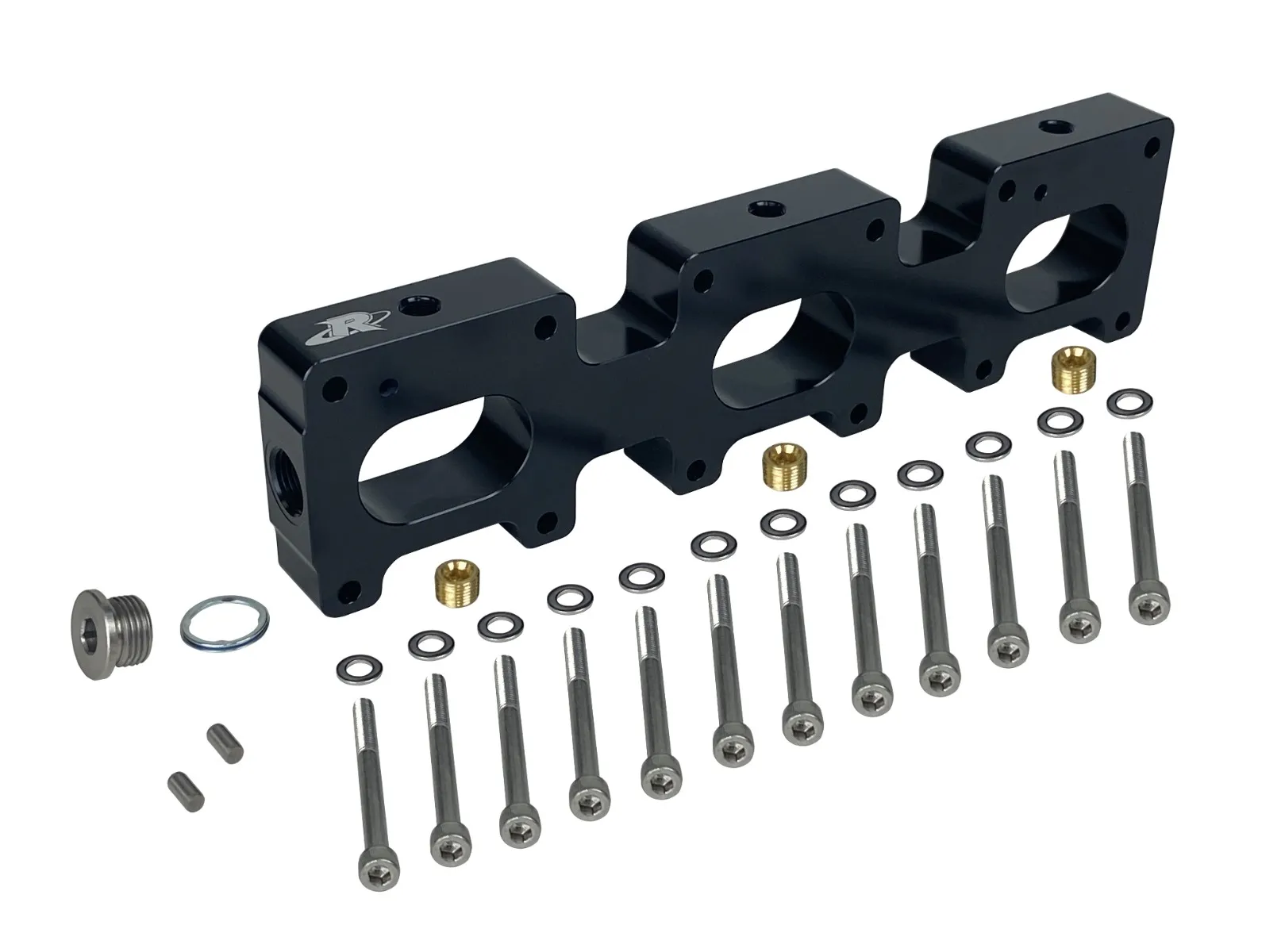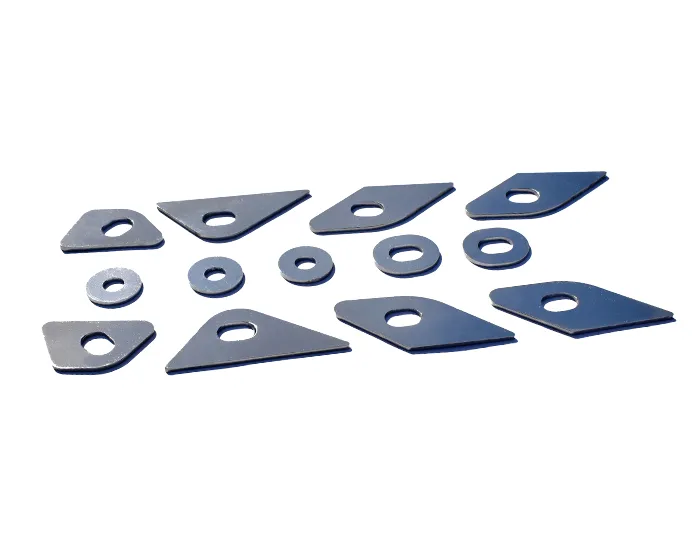The ID2600-XDS is the most recent offering from the partnership of Injector Dynamics and Bosch Motorsport.
The ID2600-XDS was developed specifically for use with liquid fuels, featuring corrosion resistant internals, and long term compatibility with ethanol and methanol.
The ID2600-XDS has the highest flow rate of any injector offered by Bosch, and flows 50% more than the ID1700x.
The ID2600-XDS benefits from Dual Slope Matching, a method of matching the flow rate in both the linear, and nonlinear operating range, providing better cylinder to cylinder consistency at low pulse widths.
What is Dual Slope Matching?
Dual Slope Matching is a method of matching injectors that provides the best possible cylinder to cylinder fueling across the entire operating range.
Traditionally, injectors were matched based on static flow rate alone, which resulted in large deviations at low pulse widths.
Injector Dynamics introduced Slope Intercept Matching over a decade ago, which provided even cylinder to cylinder fueling across the linear operating range of the injector.
With the progression of turbo technology, and increased use of alcohol fuels, greater demands are placed on fuel injectors, and they are often required to deliver fuel well outside of their linear operating range.
The concept of Dual Slope Matching extends the injector matching into the lower non linear operating range. Dual Slope Matching was conceived by Aaron Looft of Injector Dynamics, who was inspired by the dual slope injector characterization model used by Ford.
How Does Dual Slope Matching Work?
Let’s first consider static flow matching which was the industry standard prior to Injector Dynamics.
The graph below shows the dynamic response of two hypothetical 1500 cc/min injectors within their linear operating range. One with an offset (Dead time, latency, etc.) of 0.95 milliseconds, and one with an offset of 0.85 milliseconds.
The slope of both lines is the same, as they have the same flow rate, but the difference in offset results in the injector with the higher offset delivering 2.5 uL less fuel per injection event. At a pulse width of 19msec, which equals 90% duty cycle at 6,000 rpm, 2.5ul amounts to a mere 0.6% difference in flow between the two injectors, but at 2msec, that same 2.5ul difference amounts to a 9.5% difference!
Slope Intercept matching as introduced by Injector Dynamics in 2007 solved this problem by matching injectors based on flow rate (Slope) and offset (Intercept) providing even cylinder to cylinder fueling across the linear operating range.
Moving on to the non linear operating range, the graph below shows a pair of 1500cc injectors matched using the Injector Dynamics Slope Intercept method. Both injectors have the same flow rate and offset, but in the non linear range, the flow deviates from the straight line shown in the graph above. In this case, the flow rate, or slope of each injector in the non linear range is 1530cc/min and 1470cc/min representing a spread of +/- 2%.
As the graph clearly shows, the difference between the two injectors increases as pulse width decreases.
Shown as percent difference in flow, we see that even though the injectors are matched perfectly in the linear operating range, the difference in slope in the non linear range results in a flow mismatch that is magnified as the pulse-width decreases, becoming substantial at the very lowest pulse widths.
How Well Does This Work in Practice?
Moving from hypothetical injectors to a real world application, the response in the non linear range is considerably less orderly than shown in the graphs above, and is quantified using a technique called Least Squares Linear Regression – Which is a fancy way of saying straight line approximation.
By approximating the response in the non linear range, and matching sets accordingly, the best possible cylinder to cylinder fueling is realized across the entire operating range.
Using the ID2600-XDS as an example, the traditional Slope Intercept method of matching results in an average deviation of +/-5.1% in the non linear range, while the new method of Dual Slope Matching has reduced this to +/-1.4%
In a perfect world, this deviation would not exist at all, but for those of us who live (And tune!) in the real world, Dual Slope Matching represents a large step forward, and we are proud to offer it to the market.
Basic Specifications
Nominal Flow Rate – 2600cc/min @ 3.0 Bar (43.5 psi)
Maximum Differential Fuel Pressure – 9.0 Bar (130.5 psi) – Requires Minimum 11volt.
Fuel Compatibility – Compatible with Methanol/Ethanol/All Known Hydrocarbons. NOT Compatible with Ethers (MTBE, ETBE, TAME) or Nitro Methane
Electrical Connector – USCAR
Yamaha FX-SHO/FZ Watercraft 2600.27.01.48.11.4

- Shop All Categories
- Sale Items
- Accessories
- Maintenance
- Electrical
- Apparel & Riding Gear
- RIVA MaptunerX / Nano ECU Reflash & Tuning System
- HP Tuners
- FuelTech Stand Alone ECU Systems
- Performance Kits
- Air Intake
- Intercoolers
- Fuel Components
- Exhaust
- Engine
- Supercharger
- Pump & Handling
- Steering & Controls
- Flyboard Dual Impellers
- Seat Covers
- Speed Control Override Modules
- MoTeC Engine Management
- CanDoo Pro Diagnostic Systems
- CanDoo Pro GPS Speedometer Modules
- Dean's Team ECU Performance Reflash
- Dynojet CMD Marine Products
- SeaDek Traction Mats for Jetskis
- Hull Components
- 2 Stroke / 4 Stroke Freeride / Stand Up Skis
RIVA MaptunerX / Nano Tuning System for Sea Doo Watercraft
Riva MaptunerX / Nano Tuning System For Yamaha Waverunners
RIVA MaptunerX / Nano Tuning System For Kawasaki Jetskis
RIVA MaptunerX Tuning System for Sea Doo Boats
Riva MaptunerX Tuning System For Yamaha Outboards
Riva MaptunerX Tuning System For Can-Am ATV /UTV
Riva MaptunerX Tuning System For Polaris ATV /UTV
Riva MaptunerX Tuning System For Snowmobile
Sea Doo Performance Packages
- RXP-X 325 2024 (International)
- RXP-X 325 2024 (U.S./Canada)
- RXP-X 300 2021 - 2023
- RXP-X 300 2020
- RXP-X 300 2016 - 2019
- RXT-X 325 2024 (International)
- RXT-X 325 2024 (U.S./Canada)
- RXT-X/GTX Ltd. 300 2020 - 2023
- RXT-X/GTX Ltd. 300 2018 - 2019
- RXT-X 300 / GTX Ltd 300 2016 - 2017
- GTX 300/GTX Limited 300 2024
- SPARK 2014 - 2023
- GTR 230 2020 - 2023
- GTR 230/GTR-X 230 2017 - 2019
- GTI 170 2020 - 2022
- GTI 130 2020 - 2022
- GTX/WAKE PRO 230 2020 - 2022
- RXT 230/GTX 230 2018 - 2019
- GTR 215 2012 - 2016
- RXP-X 260 2012 - 2015
- RXT-X 260 2011 - 2015 / RXT 260 2011 - 2017
- RXT-X aS 260 2011 - 2016 / RXT iS 260 2011 - 2012
- RXT-X 260 2010
- RXP-X 255 2008 - 2011
- RXP 215 2004 - 2009
- RXT 215 2005 - 2009 / GTX 215 2005 - 2008
- GTX-SC 2003 - 2006 185 Non-Intercooled
- Sea-Doo Engine Internals Upgrade Kits
- GP SVHO 2024
- GP1800R SVHO 2021 - 2023
- GP1800R SVHO 2020
- GP1800R SVHO 2019
- GP1800 SVHO 2018
- GP1800 SVHO 2017
- GP1800R HO 2020+ & VXR/VX-HO 2019+
- VXR/VX-HO 2018
- VXR/VXS/VX-HO 2015 - 2017
- FX SVHO 2022+
- FX SVHO 2020 - 2021
- FX SVHO 2019
- FX SVHO 2018
- FX SVHO 2014 - 2017
- FX HO 2022 +
- FX HO 2019 - 2021
- FX HO 2018
- FX HO 2012 - 2017
- VX (TR-1) 2020 - 2022
- VX (TR-1) 2016 - 2019
- JETBLASTER 2022+
- EXR 2019 - 2021
- EX 2017 - 2023
- FZR / FZS SVHO 2014 - 2016
- FZR / FZS 2012 - 2013
- FZR / FZS 2009 - 2011
- FX-SHO 2013 - 2016
- FX-SHO 2012
- FX-SHO 2011
- FX-SHO 2008 - 2010
- SuperJet 2021 - 2023
- SuperJet 2008 - 2020
- SuperJet 1996-2007
- GP1300R 2005 - 2008
- GP1300R 2003 - 2004
- GP1200R 2000 - 2002
- FX-HO (MR-1 Engine) 2004 - 2008
- FX140 (MR-1 Engine) 2002 - 2008
- VX110 05-14 RPM Kit
- XLT 1200 2002 - 2005

